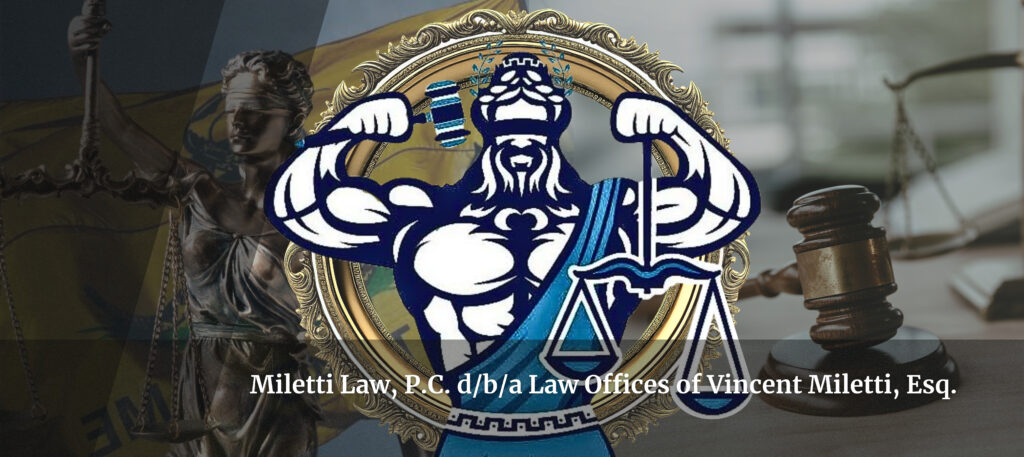Here at the Law Office of Vincent Miletti, Esq. and the home of the #UnusuallyMotivated movement, we take pride as a resilient and dependable legal services firm, providing such services in both a traditional and online, web-based environment. With mastered specialization in areas such as Employment and Labor Law, Intellectual Property (IP) (trademark, copyright, patent), Entertainment Law, and e-Commerce (Supply Chain, Distribution, Fulfillment, Standard Legal & Regulatory), we provide a range of legal services including, but not limited to traditional legal representation (litigation, mediation, arbitration, opinion letters and advisory), non-litigated business legal representation and legal counsel, and unique, online legal services such as smart forms, mobile training, legal marketing and development.
Still, here at Miletti Law®, we feel obligated to enlighten, educate, and create awareness, free of charge, about how these issues and many others affect our unusually motivated® readers and/or their businesses. Accordingly, to achieve this goal, we have committed ourselves to creating authoritative, trustworthy, & distinctive content. Usually, this content is featured as videos posted on our YouTube Channel https://www.youtube.com/channel/UCtvUryqkkMAJLwrLu2BBt6w and blogs that are published on our website WWW.MILETTILAW.COM. With that, the ball is in your court and you have an effortless obligation to subscribe to the channel and sign up for the Newsletter on the website, which encompasses the best way to ensure that you stay in the loop and feel the positive impact of the knowledge bombs that we drop here!
As the authoritative force in Employment Law, it only seemed right to introduce one of the many upcoming series in which we introduce a variety of topics that looks to educate and deliver in a manner that only Miletti Law® can. In this regard, this blog is Part II of our new series on “Employment-Based Adjustment of Status.” In Part I, we mentioned that adjustment of status, which is sometimes abbreviated as AOS, is a legal term used to describe the process through which a foreign national changes status from non-immigrant (also known as temporary citizenship) to a permanent resident (often referring to the holder of a green card), while in the country. We also noted that technically, AOS is the final step in the usually extensive and complex three-step process through which an individual with temporary citizenship status obtains permanent residence in the U.S.
However, as the primary issue of discussion in this blog, employers must be aware of the “Prerequisites for Adjustment of Status,” which is a key employment-based AOS issue worth noting for every employer.
Prerequisites for Adjustment of Status
Usually, an employee is required to complete the final step in obtaining permanent resident status in the U.S. as soon as an immigrant visa becomes available (currently, many employment-based visa categories have varied waiting periods) and after the employee has been classified under the appropriate immigrant visa category by the employer. Accordingly, the employee will have to go to a U.S. consulate or embassy and apply for an immigrant visa (this is usually known as “Consular Processing) in the country of last nationality/residence or visit the appropriate regional service center of the USCIS (United States Citizenship and Immigration Services) and fill an Adjustment of Status application as the final step. Any unmarried children below twenty-one years of age accompanying the employee, as well as the spouse of the employee, are eligible for simultaneous application.
As another prerequisite, a U.S. employer is required, on behalf of a foreign national employee, to file an I-140 Immigrant Petition under the employment-based adjustment of status. Technically, the most prevalent immigrant visa petition that a U.S. employer sponsoring a non-U.S. national for permanent residence is supposed to file is Form I-140. As a petition for a foreign national to permanently work in the U.S., this form is usually submitted to the USCIS. However, before they can file the I-485 Application to Adjust Status, most foreign nationals need to have their I-140 Immigrant Petition approved. Importantly, the foreign national must have a monthly visa bulletin from the U.S. Department of State indicating that the priority date is current and an immigrant visa is immediately available to them based on their priority date in order to file the I-485 Application. A key aspect to note is that there are separate categories of the Visa Bulletin for foreign nationals from nations that are known to have a high demand for immigrant visas historically, including the Philippines, China, Mexico, and India. Notably, there are also separate categories of the Visa Bulletin for foreign nationals from all other countries.
As part of the prerequisites, employers and employees should understand that the law provides eligibility for some foreign nationals to file both the I-485 Application to Adjust Status and the I-140 Immigrant Petition concurrently. For instance, an employer may concurrently file both the I-485 Application to Adjust Status and the I-140 Immigrant Petition on behalf of a foreign national whose priority date will be current on the I-140 submission date.
In Part III of this series, we shall move the discussion forward by hammering on “Eligibility Requirements to Adjust Status,” another fundamental aspect of employment-based adjustment of status (AOS).
In the meantime, stay tuned for more legal guidance, training, and education. In the interim, if there are any questions or comments, please let us know at the Contact Us page!
Always rising above the bar,
Isaac T.,
Legal Writer & Author.
 Professional Legal & Business Services And Representation - English & Espanol!
Professional Legal & Business Services And Representation - English & Espanol!

 314-648-2586
314-648-2586 CALL US NOW
CALL US NOW







